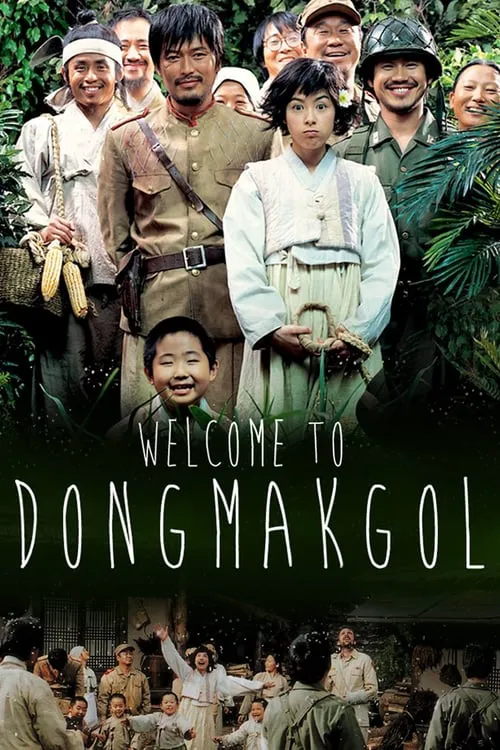Welcome to Dongmakgol

Plot
In the midst of the Korean War in 1950, a peculiar situation unfolds in the secluded village of Dongmakgol. The once-turbulent landscape is now a tranquil haven, sheltered from the chaos of war by its geographical isolation. In the midst of this serenity, three groups of soldiers converge on the village - one from North Korea, one from South Korea, and one consisting of an American pilot who crash-lands in the area. The North Korean soldiers, led by Lieutenant So Kyung-sik, are on a mission to transport a shipment of medicine to the villagers. So, a pragmatic and somewhat weary leader, has been entrusted with this task by his superior. As they enter the village, they are met with warmth and hospitality by the villagers, who are blissfully unaware of the war raging outside their tranquil haven. Meanwhile, the South Korean group, under the command of Sergeant Kang, arrives in the village, also with a different set of intentions. They are searching for a radio transmitter that has been reported to be hidden in the area. The villagers, who have never heard of this radio transmitter, are perplexed by this sudden request. Kang's group is more forceful in their approach, employing intimidation and coercion to achieve their objectives. As fate would have it, both groups arrive at the village around the same time. Initially, the North Koreans and South Koreans maintain a strained distance from each other, wary of each other's true intentions. However, as the days pass, the villagers begin to break down the rigid barriers between the soldiers, encouraging them to put aside their differences. The arrival of the American pilot, Captain Marcus Martin, adds another wrinkle to the situation. Martin, an eccentric and rugged individualist, crash-lands in the area while flying sorties in support of the South Korean military. Despite initial hostility towards the villagers, he gradually warms up to their unique brand of hospitality. Through the villagers' unwavering optimism and kindness, even the most hardened soldiers begin to question their own motives and allegiances. So, who initially seems like a seasoned veteran, is gradually stripped of his tough exterior by the villagers' innocence. Kang, initially intent on securing the village, starts to reveal his own vulnerabilities and humanity. As tensions rise between the North and South Korean soldiers, the villagers intervene, mediating a delicate balance between these opposing forces. The soldiers, caught between their duty and the villagers' innocence, begin to doubt their mission and the true meaning of war. Meanwhile, Captain Martin struggles to reconcile his duties as an American pilot with the realities of the war. He becomes fascinated with the village's unique culture and the way the villagers live in harmony with nature. His presence serves as a catalyst, bridging the gap between the soldiers and the villagers. In one poignant moment, a village elder recounts the story of how their village came to be, highlighting its isolation from the world and its unique traditions. The elder's words resonate deeply with the soldiers, and for a brief moment, the war is forgotten. The soldiers, now torn between their duty and their growing connections with the villagers, are faced with an uncomfortable reality. As the situation becomes increasingly volatile, the tension between the two groups reaches a boiling point. However, the villagers once again intervene, reminding the soldiers that they share a common humanity. In a final, heart-stopping confrontation, the North Korean and South Korean soldiers are brought together, and in a moment of shared understanding, they are able to put aside their differences and lay down their arms. The film ends on an optimistic note, with the villagers and the soldiers coming together to celebrate their newfound camaraderie. As the villagers welcome the soldiers into their homes, and the soldiers share stories of their lives, the boundaries between reality and fiction are blurred. The villagers' innocence has the power to heal even the deepest wounds, reminding us that, in the end, we are all human. In "Welcome to Dongmakgol," Director Jang Jin's masterful adaptation of his long-running play reminds us that, despite the divisions that separate us, our shared humanity is a common thread that binds us together. The film's narrative, woven on the intricate tapestry of the Korean War, weaves a poignant and uplifting tale that transcends the boundaries of politics and war, highlighting the power of love and compassion in the face of adversity.
Reviews
Recommendations




